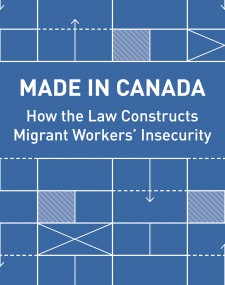
Fay Faraday, Metcalfe Foundation, September 2012
In the past decade, Canada’s labour market has undergone a significant shift to rely increasingly on migrant workers who come to Canada from around the globe on time-limited work permits to provide labour in an expanding range of industries. Since 2000, the number of migrant workers employed in Canada has more than tripled. Expanding in response to employer demand, with little public debate, the greatest proportionate growth in migrant labour has been among low-skill, low-wage workers in sectors such as caregiving, agriculture, hospitality, food services, construction and tourism. This report provides a critical analysis of the federal and provincial laws that regulate and constrain the rights of low-wage migrant workers, proposes a rights-based framework to assess their treatment, identifies the ways in which the law constructs migrant workers’ insecurity through each stage of the labour migration cycle, and examines options for systemic change to increase workers’ security.
The introduction of this report provides an overview. While labour shortages in a broad range of occupations are chronic, migrant workers in low-wage occupations which require less formal training are – by the operation of law – constructed as “temporary.” Each of Canada’s temporary labour migration programs has its own distinct legal and policy regime that structures the migrant workers’ experience of life and rights in Canada. Yet, there are significant areas of common experience and concern for the different communities of low-wage migrant workers that can provide a focus for sustainable reform. Temporary migration must not be permitted to facilitate, institutionalize and normalize a second-tier, low-wage/low-rights “guest worker” program and Canada’s dependence on temporary migration must be reversed. Instead, a critical and urgent public discussion must be engaged in about the role of temporary migration programs and why broad classes of workers who have historically played a significant role in building Canada are now, in law, excluded from permanent residence. As long as Canada operates temporary labour migration programs, however, the laws and policies that facilitate this migration must provide real security for migrant workers. The federal and provincial governments must ensure that laws and policies protect fundamental freedoms, human rights, well-recognized labour standards and principles of fairness. This protection is needed for migrant workers who are currently in Canada and those who may yet arrive… READ MORE…